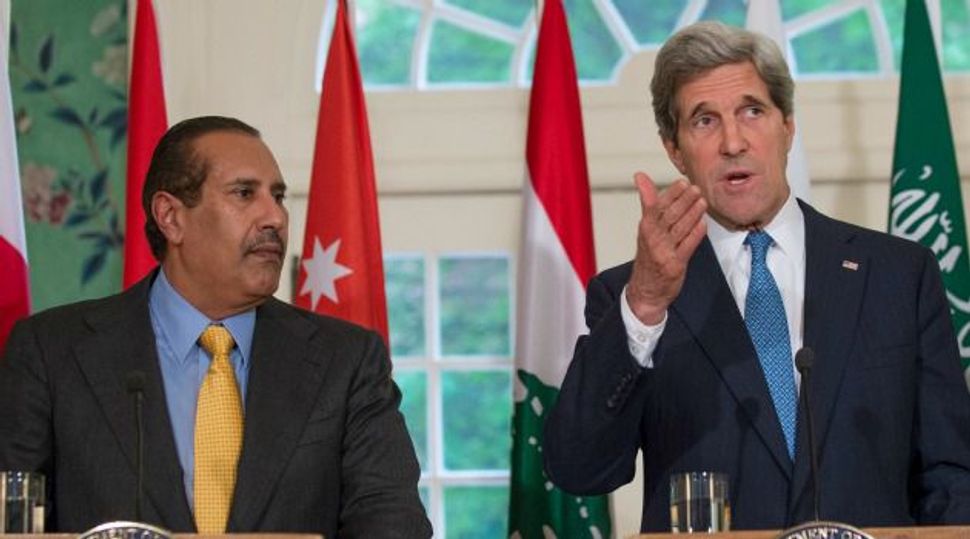Israel Happy With Arab Softening of Land-for-Peace Proposal

Image by getty images
Israel responded favourably on Tuesday to an apparent softening by Arab states of their 2002 peace plan after a top Qatari official raised the possibility of land swaps in setting borders between the Jewish state and an independent Palestine.
The original Arab League proposal offered full recognition of Israel but only if it gave up all land seized in the 1967 Middle East war and accepted a “just solution” for Palestinian refugees. Israel, which has long said it would never return to narrow pre-1967 war borders, rejected the plan at the time.
“Israel welcomes the encouragement given by the Arab League delegation and the (U.S.) Secretary of State to the diplomatic process,” a senior government official said after talks in Washington on Monday between an Arab League delegation and John Kerry on how to advance stalled Israeli-Palestinian peace talks.
In the 1967 conflict, Israel captured the West Bank, East Jerusalem and the Gaza Strip – areas Palestinians are now seeking for a state of their own. U.S.-hosted peace talks have been frozen since 2010 in a dispute over Israeli settlement expansion in the West Bank and East Jerusalem.
After the meeting with Kerry, Sheikh Hamad bin Jassim al-Thani, Qatar’s prime minister and foreign minister, told reporters: “The Arab League delegation affirmed that agreement should be based on the two-state solution on the basis of the 4th of June 1967 line, with the (possibility) of comparable and mutual agreed minor swap of the land.”
Chief Palestinian negotiator Saeb Erekat said Thani’s statement reflected longstanding Palestinian positions.
“Upon Israel’s unequivocal acceptance of the two-state solution on the 1967 border, the State of Palestine as a sovereign country might consider minor agreed border modifications equal in size and quality, in the same geographic area, and that do not harm Palestinian interests,” he said.
Israeli Justice Minister Tzipi Livni, designated by Prime Minister Benjamin Netanyahu to be his chief peace negotiator with the Palestinians, described as “very positive” news of a possible shift in the Arab League position.
“It would allow the Palestinians to enter the room and make the needed compromise and it sends a message to the Israeli public that this is not just about us and the Palestinians,” she told Army Radio.
Israel has proposed land swaps with the Palestinians in the past – exchanges that would likely leave some settlements in place – but negotiators failed to clinch a final agreement.
Whatever the Arab League’s stance, internal Palestinian divisions pose a serious obstacle, however. Palestinian President Mahmoud Abbas, who has negotiated with Israel, holds sway only in the West Bank, while Islamist rival Hamas controls Gaza and refuses to recognise Israel or renounce violence.














